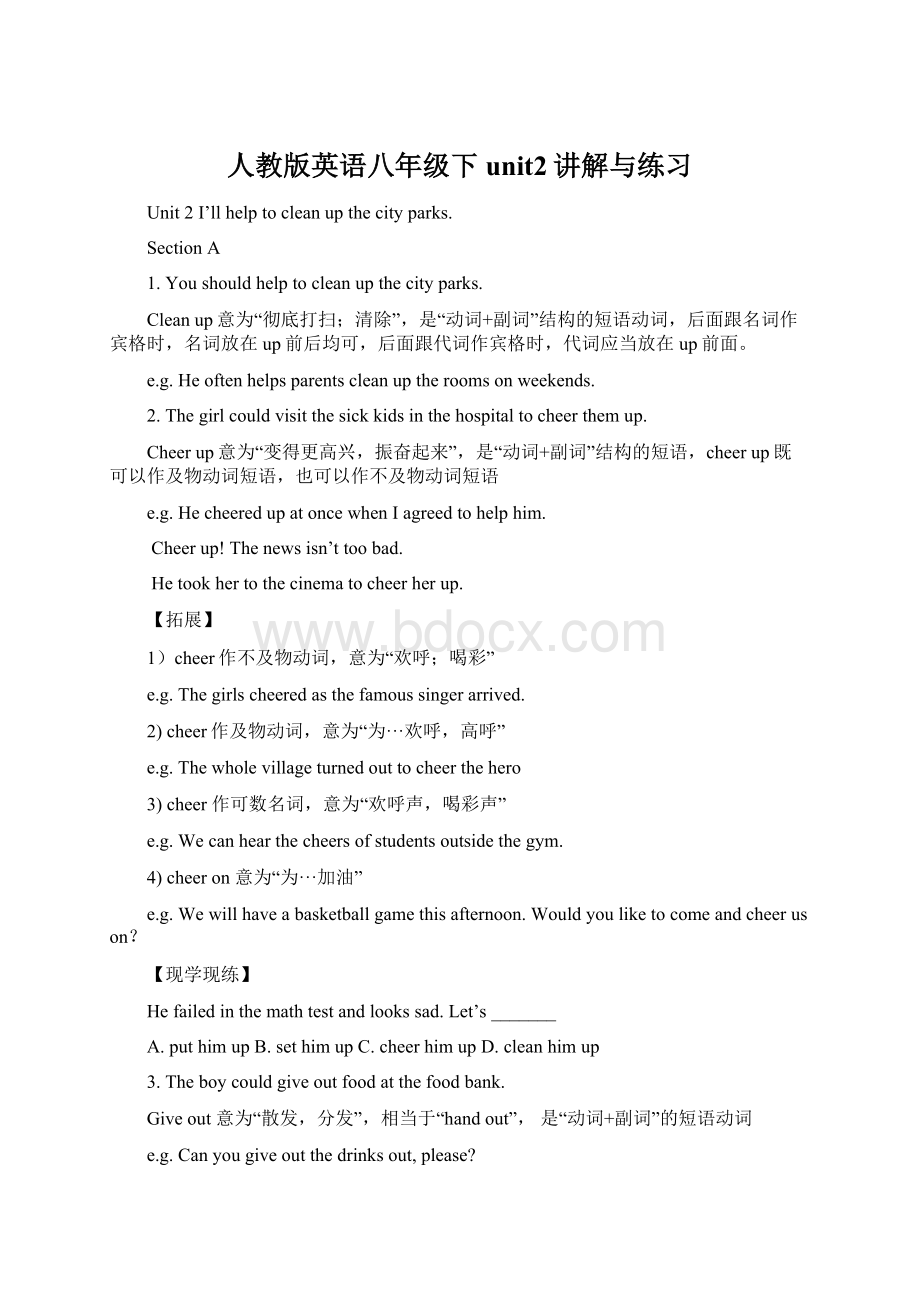人教版英语八年级下unit2讲解与练习.docx
《人教版英语八年级下unit2讲解与练习.docx》由会员分享,可在线阅读,更多相关《人教版英语八年级下unit2讲解与练习.docx(16页珍藏版)》请在冰豆网上搜索。

人教版英语八年级下unit2讲解与练习
Unit2I’llhelptocleanupthecityparks.
SectionA
1.Youshouldhelptocleanupthecityparks.
Cleanup意为“彻底打扫;清除”,是“动词+副词”结构的短语动词,后面跟名词作宾格时,名词放在up前后均可,后面跟代词作宾格时,代词应当放在up前面。
e.g.Heoftenhelpsparentscleanuptheroomsonweekends.
2.Thegirlcouldvisitthesickkidsinthehospitaltocheerthemup.
Cheerup意为“变得更高兴,振奋起来”,是“动词+副词”结构的短语,cheerup既可以作及物动词短语,也可以作不及物动词短语
e.g.HecheeredupatoncewhenIagreedtohelphim.
Cheerup!
Thenewsisn’ttoobad.
Hetookhertothecinematocheerherup.
【拓展】
1)cheer作不及物动词,意为“欢呼;喝彩”
e.g.Thegirlscheeredasthefamoussingerarrived.
2)cheer作及物动词,意为“为···欢呼,高呼”
e.g.Thewholevillageturnedouttocheerthehero
3)cheer作可数名词,意为“欢呼声,喝彩声”
e.g.Wecanhearthecheersofstudentsoutsidethegym.
4)cheeron意为“为···加油”
e.g.Wewillhaveabasketballgamethisafternoon.Wouldyouliketocomeandcheeruson?
【现学现练】
Hefailedinthemathtestandlookssad.Let’s_______
A.puthimupB.sethimupC.cheerhimupD.cleanhimup
3.Theboycouldgiveoutfoodatthefoodbank.
Giveout意为“散发,分发”,相当于“handout”,是“动词+副词”的短语动词
e.g.Canyougiveoutthedrinksout,please?
【拓展】
Giveout的不同含义:
1)giveout表示“发出(光、热、声音、气味等)
e.g.Thesungivesoutlightandheattotheearth.
2)giveout表示“用完,耗尽”
e.g.Ourfoodsuppliesbegantogiveout.
4.Thegirlcouldvolunteerinanafter-schoolstudyprogramtoteachkids.
Volunteer动词,意为“志愿做,义务做”,后可跟名词、代词或动词不定式作宾语
e.g.Jennyvolunteeredtocleanuptheroomafterparty.
【拓展】
Volunteer作可数名词,意为“志愿者”
e.g.CanIhaveavolunteertocollecttheglasses?
5.Wecan’tputoffmakingaplan
Putoff意为“推迟”,是“动词+副词”的短语动词,其后可跟名词、代词或动名词作宾语
e.g.Theyputoffthematchbecauseoftheheavyrain.
Pleasedon’tputoffdoingyourhomework.
Neverputofftilltomorrowwhatyoucandotoday.
【拓展】
由put构成的常见短语有:
Putaway将···收起来puton穿上;上演putdown放下;记下
Putout熄灭;伸出putback放回原处putup张贴;搭建
6.Let’smakesomenotices,too
Notice此处作可数名词,意为“公告牌;通告;布告”
e.g.Thereisanoticeonthewall,saying“NoParking”
I’llputupanoticeaboutthemeeting.
【拓展】
1)notice作不可数名词,意为“注意”
e.g.Takenoticeofwhattheysay.
2)notice作动词,意为“注意到,留心,看到”
e.g.DidyounoticeJackcomein?
7.Theytoldmestoriesaboutthepastandhowthingsusedtobe
Usedto意为“过去···,曾经···”,后跟动词原形,表示“过去常常做某事”,指表示过去和现在的对比,暗指现在已经不存在的动作或状态
e.g.Heusedtoworkinthehospital.
Hedidn’tusetowalkaftersupper.
【拓展】
1)beusedtodosth.意为“被用于做某事”,不定式表目的
e.g.Thebookisusedtoteachushowtowrite.
2)beusedfor+n./v.ing表示“被用于···”
e.g.Astampisusedforsendingletters.
3)get/beusedtodoingsth.
e.g.Heisusedtoeatingoutallthetime.
8.Yeah,alotofoldpeoplearelonely.
Lonely是形容词,充当表语,指“孤独的”,用于人时,表示一种心理状态,突出内心孤独寂寞的感觉,侧重缺少同伴友谊而感到孤独、寂寞。
含忧郁之意。
e.g.Hefeltverylonelywithouthisfriends.
9.···giveupseveralhourseachweektohelpothers.
Several作形容词,意为“几个,数个”,修饰可数名词复数
e.g.Severaldayslater,Grandmacametothelibrarytoborrowsomebooks.
【拓展】
Several作代词,意为“几个,数个”
e.g.Excuseme,haveyougotanybooksaboutsports?
---Yes,we’vegotseveral.
Severalofuswentthere.
10.IgetsuchastrongfeelingofsatisfactionwhenIseetheanimalgetbetterandthelookofjoyontheirowner’sfaces.
1)Feeling在此用作可数名词,意为“感觉;感触”
e.g.I’vegotabadfeeling.
Itwasagreatfeelingwhenawildanimalshowsyouaffection.
Feel还可用作连系动词,意为“觉得,感觉到”
e.g.Ifeltverytiredafterrunning.
2)satisfaction为不可数名词,意为“满意,满足”,其反义词是dissatisfaction.
e.g.Shesmiledinsatisfaction.
【拓展】
Satisfaction(名词,满意)----satisfy(动词,使满意)----satisfied(形容词,满意的)
1)besatisfiedtodosth.意为“对做某事感到满意”
e.g.Hewassatisfiedtowinthematch.
2)besatisfiedwith意为“对···感到满意”
e.g.Shewasnotsatisfiedwiththeresult.
3)joy在此用作不可数名词,意为“高兴;愉快”
e.g.Lifeisalwaysfullofjoy.
Hejumpedupwithjoy.
4)owner可数名词,意为“物主,主人”
e.g.Heistheownerofthecar.
【拓展】
1)own形容词,意为“自己的”,一般用于形容词性物主代词或名词所有格之后以加强语气。
e.g.Isawitwithmyowneyes.
2)own及物动词,意为“有;拥有”,相当于have.
e.g.Heownsabighouse.
3)ofone’sown.意为“属于某人自己的”
e.g.AtlastI’vegotabighouseofmyown.
11.Thekidsaresittinginthelibrary,butyoucanseeintheireyesthatthey’regoingonadifferentjourneywitheachnewbook.
Journey意为“旅行;行程”,可数名词,一般指长途旅行
e.g.Lifeisalongjourneyfrombirthtodeath.
12.Ourclassistryingtocomeupwithsomeideastocheerupsickchildrenbecausetheyareoftensad.
Sick形容词,意为“生病的;有病的”,其反义词为well.
e.g.Hissisterwassickwithacold.
Sick作形容词时,还可表示“(想)呕吐的,恶心的”
e.g.IalwaysfeelsickwhenItravelbyship.
Thesmellmakeshimsick.
【拓展】
Sick与ill的辨析:
Sick指“生病”时主要用于英式英语,可作定语也可作表语,表示“恶心;呕吐”时只用作表语
e.g.Heisasickman.
Hebegantofeelsickassoonastheshipstartedtomove.
Ill指“生病”时,主要用于美式英语,只用作表语,一般不作定语
e.g.Heisillandstaysinbed.
13.Forexample,wecanmakeplanstovisitsickchildreninthehospitalorraisemoneyforhomelesspeople.
Raise作及物动词,意为“筹集;征集”
e.g.Theywanttoraiseenoughmoneyforbuildingaschool.
【拓展】raise的其他用法:
1)作及物动词,意为“举起,抬起”
e.g.Pleaseraiseyourhands!
2)作及物动词,意为“种植”
e.g.Theirfamilyraisedalotofcorn.
3)作及物动词,意为“饲养,供养”
e.g.Shelikestoraiseadog.
14.Iwanttotravelalone.
Alone作副词,意为“单独地;独自地”
e.g.Helikeslivingalone.
1)alone作副词,用在名词或代词之后,意为“只有;仅仅”
e.g.Healoneunderstandsme.
2)alone作形容词,意为“独自的;单独的”
e.g.Shewasaloneinthedarkroom.
【拓展】
Alone与lonely辨析
Alone表示“单独的;肚子的”,指一个人或事物与其他的人或事物分开,不含感情色彩。
e.g.Heisaloneintheclassroom
Lonely表示“孤独的,寂寞的”,指人时含有浓重的感情色彩,即因缺少朋友、同情、亲情而产生的一种孤独、悲伤和忧郁的感情。
e.g.Shehasfewfriendshereandfeelslonely.
SectionB
1.I’verunoutofit.
Runoutof是“动词+副词+介词”的短语,of后接宾语,主语通常是表示“人”的名词,也可用于某种能消耗物品的机器等,意为“···用完了···”
e.g.I’verunoutofpaper.
【拓展】
1)runoutof可表示“从···跑出来”的意思
e.g.Thedogrunoutoftheroom.
2)runout是“动词+副词”结构的不及物动词短语,意为“用完,用尽”,主语通常是表示“时间、金钱”等无生命的东西。
e.g.Allthemoneyranoutbyme.
3)sth.runout表示“某物用尽了,用完了”
e.g.Ourfoodwillsoonrunout.
2.Itakeaftermymother.
Takeafter意为“像;与···相像”,指由于血缘关系而在外貌、性格等方面相似,相当于besimilarto,其中after是介词,其后常接名词或代词
e.g.Yourdaughterdoesn’ttakeafteryouatall.
【拓展】
1)looklike意为“看上去像···”,多指外貌
e.g.Youlooklikemybrother.
2)belike意为“像···”,可指外貌,也可指性格
e.g.Whatisyoursisterlike?
3.Irepairedit.
Repair及物动词,意为“修理,修补,修缮(房屋)”
e.g.Herepairsoldfurniture.
辨析:
repair,mend与fix
1)repair比fix和mend更正式,常用于表示修补破损或有洞的东西
e.g.Maryrepairedtheradiojustforthefunofit.
2)mend着重修补衣服上的洞、道路、屋顶或围栏等
e.g.Mymothermendedclothesformeyesterday.
3)fix侧重于“安装”,有时也用作“修理”,常用于指修理机器、车辆等
e.g.Theworkersarefixingthemachine.
4.I’msimilartoher.
1)similar形容词,意为“相似的;相仿的”
e.g.MybestfriendandIhavesimilarhobbies.
2)besimilarto意为“与···相似/相仿”
e.g.Mynewdressissimilartoyours.
【拓展】
Besimilarinsth.意为“在某方面相似/相仿”
e.g.Thetwobuildingsaresimilarinstyle.
5.WhowrotethelettertoMissLi?
1)letter可数名词,“信,函”
e.g.Tom,hereisaletterforyou.
2)writethelettertosb.相当于writetosb.意为“给某人写信”
e.g.Iamwritingthelettertomyfriend
Doyouoftenwritetoyourfriends?
【拓展】
1)receivealetterfromsb.与hearfromsb.同义,意为“收到某人的来信”
e.g.Ioftenhearfrommyfriends.
2)letter作可数名词,表示“字母”的意思
e.g.Writedowntheseletters,please.
6.I’msureyouknowthatthisgroupwassetuptohelpdisabledpeoplelikeme.
Disabled形容词,意为“丧失能力的,有残疾的”,它是动词disable(使···丧失能力)加后缀ed构成的
e.g.Weshouldhelpdisabledpeople.
It’simportanttomakefunofadisabledman.
7.Luckymakesabigdifferencetomylife.
Makeadifferenceto意为“对···产生影响”,difference前面可加修饰词,如big,great等,to是介词,其后可接名词、代词或动名词
e.g.Educationcanmakeabigdifferencetothequalityofaperson’slife.
Theaccidenthasmadeagreatdifferencetohislife.
【拓展】
Makenodifference意为“对···没有影响”
e.g.Itmakesnodifferencetome.
8.Orimagineyoucan’twalkoruseyourhandseasily.
Imagine动词,意为“想象,设想”,其后接名词、代词、动名词或宾语从句
e.g.Canyouimaginelifeonthemoon?
IcanhardlyimaginePetersailingacrosstheAtlanticOceaninfivedays.
9/Mostpeoplewouldneverthinkaboutthis,butmanypeoplehavethesedifficulities.
Difficulity作名词,意为“困难;难题”,其形容词为difficult,意为“困难的”
【拓展】
1)Difficulty表示抽象意义上的“困难”时,是不可数名词
e.g.Badplanningwillleadtodifficultylater.
2)havedifficultyindoingsth.表示“在做某事方面有困难”
e.g.Ihadgreatdifficulty(in)doingthework.
10.Openingandclosingdoors,orcarryingthingsaredifficultforme.
1)open动词,意为“打开,张开”,反义词为close
e.g.openthewindow,openyourmouth
Open与turnon辨析:
Open指将原来关着的东西打开,turnon指转动或推上开关等打开
2)carry及物动词,意为“拿,提,扛”
e.g.Healwayscarriesasmallboxinhishand.
Carry,bring,take的用法辨析:
Carry不表示动作的方向,一般指随身携带,如“扛、提、运”等
e.g.Pleasecarrythebagforme.
Bring指把人或物从别处带到说话者所在的地方
e.g.Bringthebooktome,please.
Take指把人或物从说话者的地方带到别处去
e.g.Takemyboxtotheroom.
【拓展】
Open还可用作形容词,主要用法如下:
1)开着的,反义词为closed
e.g.Allthedoorsareopen.
2)开张的,营业的
e.g.Theshopisopenfrom9amto6am.
3)开放的
e.g.Ourcountryisopentotheworldnow.
11.Thenonedaylastyear,afriendofminehelpedmeout
1)afriendofmine指“我的一位朋友”,是双重所有格,相当于oneofmyfriends.
2)helpsb.out指“帮助某人摆脱困境;帮助某人解决难题”
e.g.Helpthemoutaspossibleasyoucan.
12.Iwasexcitedabouttheideaofhavingadog.
1)excited形容词,意为“兴奋的,激动的”,可作表语或定语,作表语时,主语一般是表示“人”的名词或代词;作定语时,一般修饰表示“人”的名词或代词
e.g.Tomwasexcitedafterhearingofthegoodnews.
Theexcitedchildrenareopeningtheirpresents.
Excited与exciting的用法辨析:
Excited意为“兴奋的,激动的”,多用于修饰人;exciting意为“使人兴奋的,刺激的”,修饰物
e.g.Theboywasexcitedwhenheheardtheexcitingnews.
2)beexcitedabout意为“对···感到兴奋、激动”
e.g.Iwasexcitedaboutgoingtothezoo.
13.LuckyisverycleverandunderstandsmanyEnglishwords.
Understand既可作及物动词,又可作不及物动词,意为“理解;领会;明白”
e.g.Doyouunderstandme?
Hedoesn’tunderstandEnglish.
【拓展】
1)understand后可接从句:
e.g.Iunderst